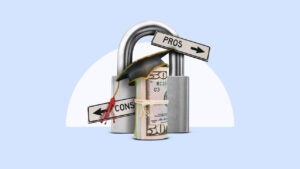Pros and cons of bad credit business loans

Key takeaways
- Bad credit business loans are available for business owners with poor credit histories, but they often come with higher interest rates and fees
- Understanding eligibility requirements and working to increase your credit score can improve the chances of loan approval
- Equipment loans and invoice factoring are alternative methods of business financing that may be easier to qualify for with bad credit
When you have fair or bad credit (a FICO score of 669 and below), getting approved for a business loan can be tough. In 2024, 29 percent of small-business owners who were denied small-business financing cited bad credit as the reason for denial.
While business loans for bad credit can offer funding for borrowers who would otherwise be unable to access capital, these loans are not without their drawbacks. It’s important to weight all the pros and cons before taking out a bad credit business loan.
What is a bad credit business loan?
A bad credit business loan is any loan or financial product open to borrowers with poor credit. They work like any other business loan; however, in addition to having more lenient qualification requirements, they may also come with higher interest rates and shorter terms. Online lenders commonly lend to borrowers with bad credit, but you can also get bad credit business loans from traditional banks, minority depository institutions (MDIs) and community development financial institutions (CDFIs).
Bad credit business loans are available for businesses with low credit scores, but maintaining a healthy score is important. Owners should avoid utilizing more than 20 to 30 percent of their available credit and accumulating too much debt on a single card. Additionally, keeping accounts open rather than closing them and working to build business credit will improve their score.
Bad credit business loan pros
These loan products have advantages that could make them the right funding source for your business.
Accessible financing
Many business owners don’t have enough capital on hand to cover all their needs and goals. Business loans provide an external source of financing that can help you achieve short-term and long-term business goals.
Small business loans for bad credit offer accessible financing to business owners with subprime credit. This is helpful if you don’t have time to build credit before seeking a loan. Like with other business loans, the funds from a bad credit business loan can cover just about any business-related cost, including:
- Startup business costs
- Day-to-day expenses
- Equipment purchases
- Business expansion
- Emergencies
- Cover short-term gaps in funding
Fast approvals and funding times
Many lenders that offer fast business loans will work with borrowers with credit scores as low as 500. Especially with online lenders, you may be able to apply and get approved for a bad credit business loan in as few as a few hours.
Rebuild credit
Many lenders report payment history to at least one of the three major personal credit bureaus — Experian, TransUnion and Equifax — or business credit bureaus, depending on the business’s age and type of debt, which can help build a positive repayment history on your credit report.
Bad credit business loan cons
Despite their attractive benefits, bad credit business loans also have their share of drawbacks to be aware of when evaluating your funding options.
Lower loan amounts
Some bad credit lenders offer much smaller maximum loan amounts than you’d find with traditional business loans.
If you have significant funding needs, you may have to take out several loans or resort to an alternative funding source if the lender doesn’t offer the loan amount you need. Or you could hold off on applying for a loan and work to improve your credit score to unlock better funding opportunities.
Higher interest rates and fees
To help offset the risk, bad credit business loans come with steeper borrowing costs to protect the lender if you default on the loan agreement. That means higher interest rates on loans for bad credit borrowers. Depending on the type of loan, you can find interest rates from 35 percent to 99 percent or higher.
You may also find higher loan fees. For example, borrowers with good or excellent credit may pay low origination fees between 0.5 percent and 1.5 percent. But bad credit borrowers could see origination fees of 4 percent or higher.
Make sure to shop with multiple lenders before applying to find the option that offers the most favorable terms and helps you minimize borrowing costs.
Some high-risk business loans use factor rates instead of interest rates to calculate the cost of a loan. Factor rates typically range from 1.1 to 1.5 and are fixed costs that don’t change over the life of the loan. Make sure to convert factor rates to interest rates to compare with other loans and to make sure you choose the most affordable loan.
Collateral requirements
You may find that lenders aren’t willing to lend to you unless you put up collateral. The advantage of a secured loan is that the rates are typically lower than an unsecured business loan.
A secured business loan may seem appealing, especially if the terms are competitive. The downside is that you could lose your collateral if you fall behind on the loan payments. You may also be required to sign a personal guarantee, which means that the lender can come after your personal savings and assets if you default on the business loan.
If you’re confident making loan payments won’t be an issue, go with a secured loan. Otherwise, consider unsecured loan options, even if it means slightly higher borrowing costs, to protect your business assets.
Collateral is typically an asset that the borrower provides to the lender as assurance for repayment of the loan. It ensures that the lender is not the only party at risk if the borrower defaults on the loan. If the borrower is unable to repay the loan, the lender can claim the collateral as a means of recovering the borrowed funds.
How to get a business loan with bad credit
If you decide to move forward with a bad credit business loan, there are ways to increase your chances of approval. Here’s how to get a bad credit business loan:
1. Update your business plan. A business plan shows lenders that you have a strategy for your business, which includes future revenue and growth. Not every lender requires a business plan, but keeping it updated is beneficial.
2. Choose the right type of loan. Choosing the best business loan for bad credit is essential to meeting your business’s needs. Think about why you need the loan, if you have collateral to secure it, the ideal repayment period and what options have manageable interest rates.
3. Shop for the right lender. Once you know what type of loan you’d like, choosing the right lender is the next step. You’ll want to explore any lender that offers the type of loan you’re looking for and review its terms and conditions to ensure it’s the best fit.
4. Strengthen your loan application. Ensuring your loan application is as strong as possible will help increase your chances of approval. You can consider finding a co-signer, improving your credit score, offering a down payment or boosting your annual revenue before applying for a loan.
While deciding which type of loan is best for your business, consider using a business loan calculator. The calculator can show you estimated payments based on interest rates, loan terms and loan amounts. That way, you’ll know you can afford the financing you ultimately agree to.
Alternatives to bad credit business loans
If a bad credit business loan isn’t the right fit for you, consider these alternatives:
- Borrow from a friend or relative. You can take out an interest-free or low-interest loan from a friend or relative. Be sure to only borrow what you can comfortably afford to pay back and get the loan agreement in writing.
- Use a personal loan. A personal loan may be an option if you’re planning to open a business soon. Some lenders restrict the ways funds can be used, so confirm business expenses are allowed before moving forward.
- Use a crowdfunding platform. Consider raising funds for your business through a crowdfunding platform like Indiegogo or Kickstarter. You’ll generally have to provide equity in your business or something of value in exchange for donations. Still, you won’t have to pay the money back to donors.
- Apply for grants. Although they can be competitive, small business grants don’t require repayment and don’t take credit into account. Typically, they just require submitting an application to ensure you meet the eligibility requirements.
- Get a business credit card. While business credit cards will take your credit into account, there are secured and unsecured options for those with lower credit scores. These can help you build your business credit and may come with introductory offers, such as cash back or rewards.
The bottom line
Ideally, you want a small business loan that offers competitive terms and meets your funding needs. If you have bad credit, your options may be limited, but that doesn’t mean you’re entirely out of luck.
A bad credit business loan could be a solution, but it’s worth evaluating the benefits and drawbacks to decide if it’s a good fit.
Familiarize yourself with the small business lending process and shop around with multiple lenders to find the best deal on financing. Most importantly, run the numbers to determine if you should move forward with applying or explore an alternative funding source.
Frequently asked questions
Why we ask for feedback Your feedback helps us improve our content and services. It takes less than a minute to complete.
Your responses are anonymous and will only be used for improving our website.
You may also like

Pros and cons of private student loans

What are the pros and cons of home equity loans?

Pros and cons of short-term business loans

Types of bad credit business loans


